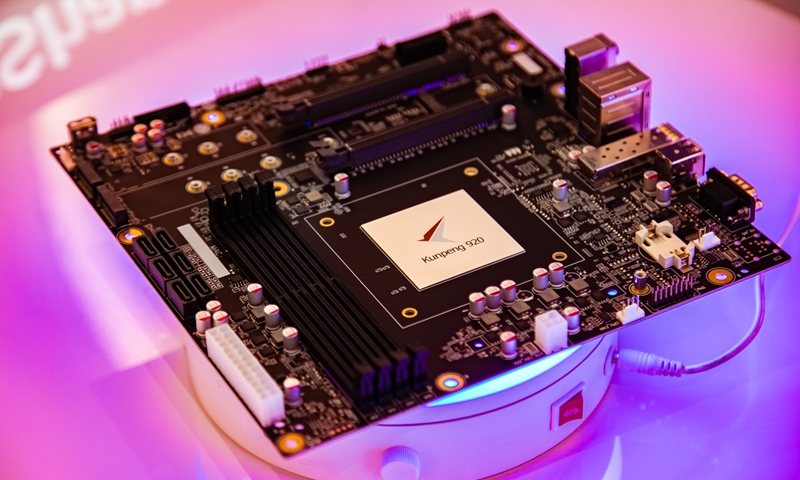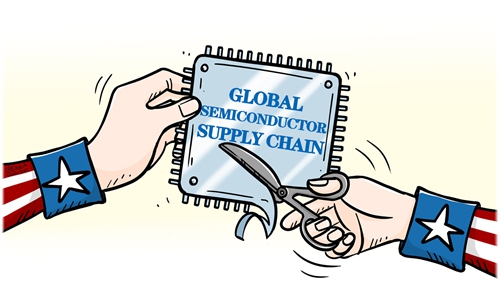As China resists brief trouble, US ushers in long-term pain: Global Times editorial

Kunpeng 920 chip is showcased at Huawei's Kunpeng Ecosystem Base in Chengdu, Southwest China's Sichuan Province on January 10, 2022. Photo: VCG
Bloomberg recently reported that 19 of the world's 20 fastest-growing chip-making firms over the past four quarters hail from the Chinese mainland. This is a manifestation of the boom in chip manufacturing and supply in the mainland. The chip industry is widely known as the very core target of the US-launched trade war and science and technology war against China, and it is also the key field where the Chinese industry has been harshly contained. But after arduous struggle in the past few years, instead of being defeated by the US, it has started to bloom.Such a result obviously shocked supporters of the US trade war against China. At the very beginning, they took an arrogant stance that they would strangle China's growth even if they had to give up some of their interests. They launched the "biggest trade war since the 1930s," which attracted the attention of the world, and even made some Chinese shrink back. But the prediction that China would "run out of bullets first" has not become a reality. Instead, the brutal suppression has fueled the growth of China's key industries.
It is worth noting that industry insiders reached by the Global Times all expressed their vigilance against US and Western public opinion of "killing China by over-praising it." On the one hand, they believe that there is still a gap between China's core technology and that of the US; on the other hand, they have firm confidence in China breaking through US' containment. This mature mind-set, which is neither arrogant nor belittling, has gradually become the mainstream consciousness in Chinese society, which is reflected in both minds and deeds.
Although the economic, trade and technological crackdown launched by the US has caused some short-term difficulties for the Chinese economy, it has further inspired the Chinese people to work hard and form a strong consensus on independent innovation. There used to be misperceptions such as "kowtowing to the US" and "Americaphobia" in the Chinese society in the past, and the mentality of being dependent on others for key technologies, but all have been corrected.
In short, when it comes to the trade war, China does not want one, but it is not afraid of one and will fight one if necessary. As China has withstood the short-term pain, the country's inherent resilience has continued to increase.
In contrast, the US in recent years has not achieved the goal of strangling the Chinese economy, nor has it reaped the benefits the initiators of the trade war had expected. Instead, the US economy is ushering in long-term pain - the most serious inflation over the past 40 years has greatly increased the living costs of ordinary Americans. In 2021, US automakers cut production by 7 million vehicles due to chip shortages, pushing up prices for new cars by 8 percent and used cars by over 40 percent. Tracing back, one will find an important reason for the scenario is Washington's violation of the law and forcibly interfering in China-US economic and trade exchanges by political means.
Although there are still US politicians justifying the trade war against China and claiming to convince Americans that China "poses an existential threat to the US," the icy reality dispels illusory fanaticism. Today, those arrogant American elites are more anxious when they have to face China, and they become more entangled in bashing China. It is against this backdrop that Washington has floated trial balloons frequently in recent days, claiming that it is considering canceling some of the tariffs imposed on Chinese imports as if it is willing to put the brakes on the trade war with China.
However, it should also be noted that Washington has not veered back to its rationality toward China, which is also reflected in the opportunism of some politicians, who are sometimes fanatical and sometimes "moderate."
Although there were such reports being released time and again, the White House said in the past few days that no decision was made to lift some tariffs imposed on Chinese imports before next week's Group of Seven summit.
However, the repeated trials have become impossible to cause any emotional fluctuation among the Chinese people. At this time, it seems we have inadvertently glimpsed Washington's free performance hoping to attract attention. Therefore, we would not stop to take a closer look and just remind ourselves at the same time that it is most important to do our own thing well.
In this round of the US-launched trade war against China, it's the US' business credibility and the national image that have been damaged the most. If the US wants to repair it, it must show greater sincerity and make greater efforts. Taking China as an imaginary enemy, the US has chosen the wrong opponent and used the wrong method. The biggest opponent of hegemony is the general trend, and anyone acting against the general trend is doomed to fail.



